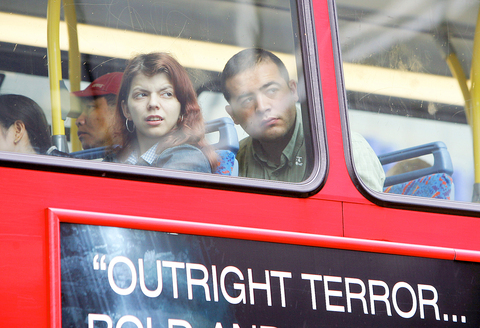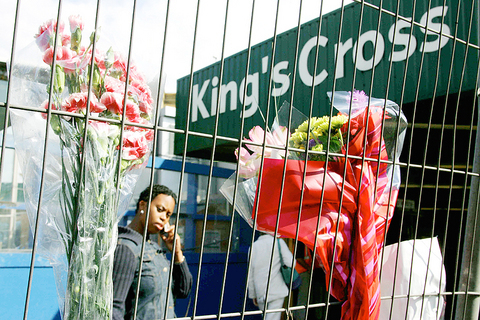Commuters in London reluctantly descended into the Underground yesterday morning, while police scrambled through dangerous rail tunnels deep underground yesterday to hunt for clues and retrieve bodies after suspected al-Qaeda bombers killed more than 50 people in London rush-hour blasts.
A day after four bombs tore through three underground trains and a red double-decker bus, commuters headed to work again on London's battered transport network, some fearful, some defiant, undeterred by the knowledge it might happen again.
"My granddad called me last night and told me I had to go to work today," said Sally Higson, 36. "He's 89. He lived through the war and said it was important to carry on as normal."

PHOTO: AFP
"I was scared, but what can you do?" said Raj Varatharaj, 32, emerging from a subway station. "This is the fastest way for me to get to work. You just have to carry on."
Ten of London's 12 subway lines reopened yesterday, though service on three was restricted. Bus service was running through central London, except for diversions around blast sites.
Thursday's attacks -- which ministers said bore the hallmarks of the Islamic militant al-Qaeda network -- were London's deadliest in peacetime.

PHOTO: AFP
Sir Ian Blair, commissioner of the Metropolitan Police, said more than 50 people were killed in the blasts and 700 wounded.
He said the final death toll was not yet known. Police had yet to reach one of the bombed underground carriages in central London as the surrounding tunnel was unsafe, but Blair said no survivors were trapped underground and the task now was to retrieve bodies.
Andy Trotter of the British Transport Police said the number of bodies still trapped was not known, but one police source said it could be more than 10.
"This was a crowded tube train at rush hour in central London with several hundred people on board," Trotter said.
Andy Hayman, of the London police specialist operations branch, spoke of the "extreme circumstances" under which rescuers were working, saying they faced the hazards of tunnel collapse, vermin and "dangerous substances" in the air.
"I think we can all respect the sort of things our people are actually confronting," he said.
A maintenance worker, who did not want to be identified, said he had reached the site early yesterday and described "awful" scenes, with several bodies in the carriage.
"We got up to the carriage, although it was very dark there at the time," he said. "The smell was awful."
Hayman said the bombs were believed to have contained up to 4.5kg of explosives and could have been carried onto the trains and bus in backpacks.
Police denied that they had found any unexploded devices. On Thursday, a senior US counterterrorism official who spoke on condition of anonymity because of the sensitivity of the information had said British authorities identified suspicious packages and detonated them in controlled explosions.
Police said they had no specific intelligence warning of the attacks. Home Secretary Charles Clarke said the blasts "came completely out of the blue."
The New York Times reported yesterday that timing devices rather than suicide bombers set off the explosions.
Clarke told BBC radio that investigators were examining a statement from the "Secret Group of al-Qaeda's Jihad in Europe."
The e-mail statement by the previously unknown group said: "Our mujahideen have carried out a blessed invasion in London and here is Britain now burning with fear and terror ... We have repeatedly warned Britain and have kept our promise."
""We monitor now very intensively a wide range of Web sites ... Their claim is something we certainly take seriously," Clarke said.
An Internet statement from another group, calling itself the "Organization of al-Qaeda - Jihad in the Arabian Peninsula" praised the attacks and said Rome would be targeted next.
Queen Elizabeth II and her son Prince Charles visited bombing victims at the crowded St. Mary's Hospital yesterday.
"It's been one of the things that many of us have dreaded for a long time," Charles said, speaking to patients injured in the blasts.
"What I can never get over is the resilience of the British people who have set us all a fantastic example of how to recover," he said.
Also see stories:
Premier urges calm after terror attacks in London

CHAOS: Iranians took to the streets playing celebratory music after reports of Khamenei’s death on Saturday, while mourners also gathered in Tehran yesterday Iranian Supreme Leader Ayatollah Ali Khamenei was killed in a major attack on Iran launched by Israel and the US, throwing the future of the Islamic republic into doubt and raising the risk of regional instability. Iranian state television and the state-run IRNA news agency announced the 86-year-old’s death early yesterday. US President Donald Trump said it gave Iranians their “greatest chance” to “take back” their country. The announcements came after a joint US and Israeli aerial bombardment that targeted Iranian military and governmental sites. Trump said the “heavy and pinpoint bombing” would continue through the week or as long

TRUST: The KMT said it respected the US’ timing and considerations, and hoped it would continue to honor its commitments to helping Taiwan bolster its defenses and deterrence US President Donald Trump is delaying a multibillion-dollar arms sale to Taiwan to ensure his visit to Beijing is successful, a New York Times report said. The weapons sales package has stalled in the US Department of State, the report said, citing US officials it did not identify. The White House has told agencies not to push forward ahead of Trump’s meeting with Chinese President Xi Jinping (習近平), it said. The two last month held a phone call to discuss trade and geopolitical flashpoints ahead of the summit. Xi raised the Taiwan issue and urged the US to handle arms sales to

State-run CPC Corp, Taiwan (CPC, 台灣中油) yesterday said that it had confirmed on Saturday night with its liquefied natural gas (LNG) and crude oil suppliers that shipments are proceeding as scheduled and that domestic supplies remain unaffected. The CPC yesterday announced the gasoline and diesel prices will rise by NT$0.2 and NT$0.4 per liter, respectively, starting Monday, citing Middle East tensions and blizzards in the eastern United States. CPC also iterated it has been reducing the proportion of crude oil imports from the Middle East and diversifying its supply sources in the past few years in response to geopolitical risks, expanding

Pro-democracy media tycoon Jimmy Lai’s (黎智英) fraud conviction and prison sentence were yesterday overturned by a Hong Kong court, in a surprise legal decision that comes soon after Lai was jailed for 20 years on a separate national security charge. Judges Jeremy Poon (潘兆初), Anthea Pang (彭寶琴) and Derek Pang (彭偉昌) said in the judgement that they allowed the appeal from Lai, and another defendant in the case, to proceed, as a lower court judge had “erred.” “The Court of Appeal gave them leave to appeal against their conviction, allowed their appeals, quashed the convictions and set aside the sentences,” the judges